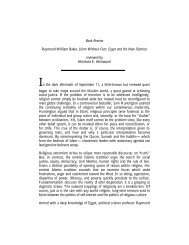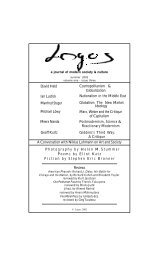Michael J. Thompson Stephen Eric Bronner Wadood Hamad - Logos
Michael J. Thompson Stephen Eric Bronner Wadood Hamad - Logos
Michael J. Thompson Stephen Eric Bronner Wadood Hamad - Logos
You also want an ePaper? Increase the reach of your titles
YUMPU automatically turns print PDFs into web optimized ePapers that Google loves.
Ali Hossaini<br />
scientific truths. Taking the state as an analytic condition, we might speculate<br />
on the next stage of perceptual technology. Surveying produced perspective,<br />
which in turn led to photography and television. Engineers are already<br />
producing immersive digital environments, some of which may do away with<br />
cameras and material displays. Direct neural couplings will be widely<br />
available in the foreseeable future. Scientists have already bypassed eyes and<br />
ears, and advanced haptic interfaces could simulate the balance of senses.<br />
There is no reason to feed real-world camera images into a neural coupling—<br />
digital environments would work just as well. Artists and engineers have<br />
already started designing imaginary spaces, giving us a taste of possible future<br />
environments. (See Figure 7) In a stable virtual world, neurally induced<br />
experiences could collapse the opposition between subject and object, along<br />
with distinctions among vision, photography and architecture. As our senses<br />
adapted to the new environment, culture might evade nature altogether,<br />
referring only to itself. What sort of societies might evolve in such a space?<br />
Figure 7: A Virtual Space<br />
Designed by the NOX studio in Rotterdam, this virtual space is accessed through head<br />
mounted goggles. Within a few years, the environment may be accessed through direct<br />
neural coupling between the brain and the computer which generates it. (Zellner, 1999)<br />
Strict control of virtual worlds could create a kind of planetary dungeon.<br />
Economics would dictate the rhythm of daily life, which would be governed<br />
by a central body according to laws of consumption and production.<br />
Freedom could be severely curtailed in this environment, which might<br />
resemble a digital version of Jeremy Bentham’s panopticon. Proposed in the<br />
eighteenth century, the panopticon was designed as an ideal prison which<br />
concealed nothing from the guards. Misbehavior was unlikely in such a place.<br />
More advanced technologies are beginning to impose a similar effect on<br />
<strong>Logos</strong> 2.3 – Summer 2003




